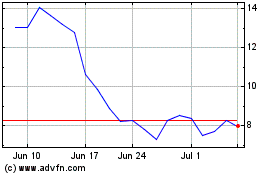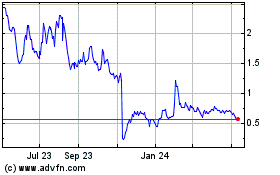Atara Biotherapeutics Receives FDA Orphan Drug Designation for ATA230
September 05 2017 - 8:00AM

Atara Biotherapeutics, Inc. (Nasdaq:ATRA), a leading
"off-the-shelf" T-cell immunotherapy company developing novel
treatments for patients with cancer and autoimmune diseases, today
announced that ATA230 was granted orphan drug designation for the
treatment of cytomegalovirus (CMV) viremia and disease in
immunocompromised patients by the U.S. Food and Drug Administration
(FDA). ATA230, an allogeneic T-cell immunotherapy targeting
antigens expressed by CMV, has been investigated in one Phase 1 and
two Phase 2 clinical studies in patients with CMV viremia and
disease who are refractory or resistant to antiviral drug
treatment.
“We are delighted that the therapeutic potential of our
allogeneic T-cell immunotherapies in orphan diseases continues to
be recognized by the FDA,” said Isaac Ciechanover, M.D., Chief
Executive Officer and President of Atara Biotherapeutics. “We
believe that the high unmet medical need of immunocompromised
patients with antiviral refractory or resistant CMV and compelling
ATA230 clinical data provide a strong rationale for continued
development. We look forward to further evaluating ATA230
development plans with the FDA and other global health authorities
following the initiation of our ATA129 EBV-PTLD Phase 3
studies.”
Orphan drug designation is granted by the FDA to novel drugs and
biologics which are defined as those intended for the safe and
effective treatment, diagnosis or prevention of rare
diseases/disorders that affect fewer than 200,000 people in the
U.S. The designation provides incentives for sponsors to develop
products for rare diseases, which may include tax credits towards
the cost of clinical trials and prescription drug user fee waivers.
The orphan drug designation also would entitle Atara to a
seven-year period of marketing exclusivity in the United States for
ATA230 should Atara receive FDA approval for the treatment of CMV
viremia and disease in immunocompromised patients.
About CMVIn patients with weakened immune
systems, including bone marrow and solid organ transplant
recipients as well as those with human immunodeficiency virus (HIV)
and symptomatic congenital CMV infections, CMV
causes potentially life-threatening disease that can result in
blindness, brain damage and difficulty breathing. While
small-molecule antiviral drugs are approved to treat and prevent
CMV infection, viral resistance and adverse effects, such as kidney
toxicity and a reduction in white blood cell count impairing the
ability to fight other infections, remain a challenge.
About ATA230ATA230, an allogeneic T-cell
immunotherapy targeting antigens expressed by CMV, has been
investigated in one Phase 1 and two Phase 2 clinical studies in
patients with CMV viremia and disease who are refractory or
resistant to antiviral drug treatment. In October 2016, the
European Medicines Agency (EMA) issued a positive orphan drug
designation opinion for ATA230 for the treatment of CMV infection
in patients with impaired cell-mediated immunity. Atara plans to
further evaluate ATA230 development plans with the FDA and
other global health authorities following the initiation of ATA129
EBV-PTLD Phase 3 studies.
About Atara Biotherapeutics, Inc. Atara
Biotherapeutics, Inc. (@Atarabio) is a leading cell therapy company
developing novel treatments for patients with cancer and autoimmune
diseases. The Company’s “off-the-shelf”, or allogeneic, T-cells are
engineered from donors with healthy immune function and allow for
rapid delivery from inventory to patients without a requirement for
pretreatment. Atara’s T-cell immunotherapies are designed to
precisely recognize and eliminate cancerous or diseased cells
without affecting normal, healthy cells. Atara’s most advanced
T-cell immunotherapy in development, ATA129, is being developed for
the treatment of cancer patients with rituximab refractory
Epstein-Barr virus (EBV) associated post-transplant
lymphoproliferative disorder (EBV-PTLD), as well as other EBV
positive hematologic and solid tumors including nasopharyngeal
carcinoma (NPC). Phase 3 studies of ATA129 in EBV-PTLD following a
hematopoietic cell transplant (HCT) or solid organ transplant (SOT)
are expected to start in 2017, and a Phase 1/2 study of ATA129 in
combination with Merck's anti-PD-1 (programmed death receptor-1)
therapy, KEYTRUDA® (pembrolizumab), in patients with
platinum-resistant or recurrent EBV-associated NPC is planned for
2018. ATA129 is also available to eligible patients with
EBV-positive tumors through an ongoing multicenter expanded access
protocol (EAP) clinical study. Atara expects to submit ATA129 for
conditional marketing authorization in EBV-PTLD following HCT in
the EU in 2018. ATA188, the Company’s next generation T-cell
immunotherapy for autoimmune diseases, selectively targets specific
EBV antigens believed to be important for the potential treatment
of multiple sclerosis (MS). A Phase 1 clinical study of autologous
ATA188 in progressive forms of MS is ongoing, and a Phase 1
allogeneic ATA188 clinical study is expected to begin in the second
half of 2017. Atara’s clinical pipeline also includes ATA520
targeting Wilms Tumor 1 (WT1) and ATA230 directed against
cytomegalovirus (CMV).
Forward-Looking StatementsThis press release
contains or may imply "forward-looking statements" within the
meaning of Section 27A of the Securities Act of 1933 and Section
21E of the Securities Exchange Act of 1934. For example,
forward-looking statements include statements regarding: the
Company’s belief that the high unmet medical need of
immunocompromised patients with antiviral refractory or resistant
CMV and compelling ATA230 clinical data provide a strong rationale
for the continued development of ATA230; the Company’s plan to
further evaluate ATA230 development and study designs with the FDA
and other global health authorities following the initiation of the
ATA129 EBV-PTLD Phase 3 studies; the Company’s expected initiation
of Phase 3 studies of ATA129 in EBV-PTLD following a HCT or SOT in
2017, a Phase 1/2 study of ATA129 in combination with Merck's
anti-PD-1 therapy, KEYTRUDA® (pembrolizumab), in patients with
platinum-resistant or recurrent EBV-associated NPC in 2018 and a
Phase 1 allogeneic ATA188 clinical study in the second half of
2017; and the Company’s expected submission of a conditional
marketing authorization application in EBV-PTLD following HCT in
the EU in 2018. Because such statements deal with future
events and are based on Atara Biotherapeutics’ current
expectations, they are subject to various risks and uncertainties
and actual results, performance or achievements of Atara
Biotherapeutics could differ materially from those described in or
implied by the statements in this press release. These
forward-looking statements are subject to risks and uncertainties,
including those discussed under the heading "Risk Factors" in Atara
Biotherapeutics’ quarterly report on Form 10-Q filed with the
Securities and Exchange Commission (SEC) on August 7, 2017,
including the documents incorporated by reference therein, and
subsequent filings with the SEC. Except as otherwise required by
law, Atara Biotherapeutics disclaims any intention or obligation to
update or revise any forward-looking statements, which speak only
as of the date hereof, whether as a result of new information,
future events or circumstances or otherwise.
INVESTOR & MEDIA CONTACTS:
Investors:
John Craighead, Atara Biotherapeutics
650-491-5806
jcraighead@atarabio.com
Steve Klass, Burns McClellan
212-213-0006 x331
sklass@burnsmc.com
Media:
Justin Jackson, Burns McClellan
212-213-0006 x327
jjackson@burnsmc.com
Atara Biotherapeutics (NASDAQ:ATRA)
Historical Stock Chart
From Mar 2024 to Apr 2024

Atara Biotherapeutics (NASDAQ:ATRA)
Historical Stock Chart
From Apr 2023 to Apr 2024
